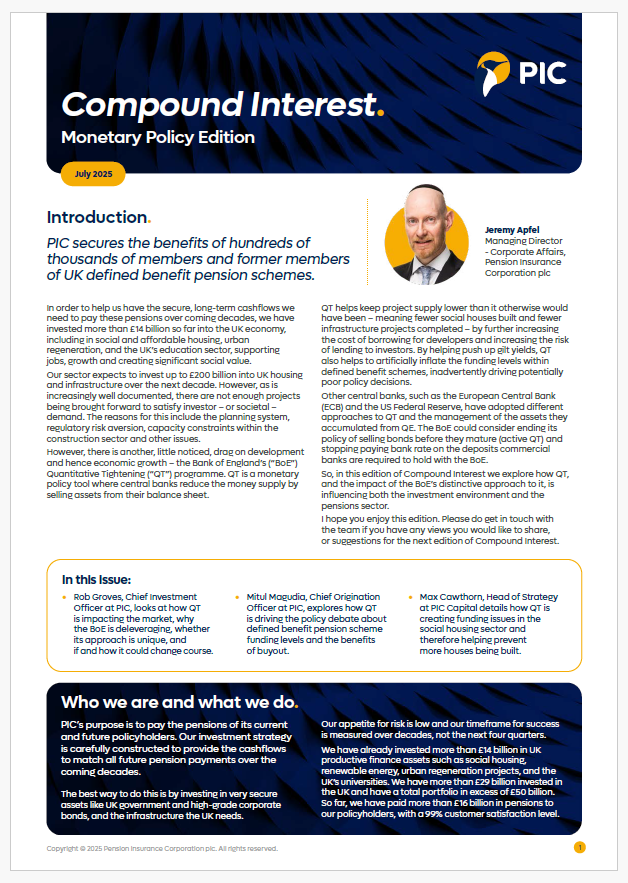About Us
Trustees
Policyholders
Purposeful investments
Investors
New & insight
PIC secures the benefits of hundreds of thousands of members and former members of UK defined benefit pension schemes.
In order to help us have the secure, long-term cashflows we need to pay these pensions over coming decades, we have invested more than £14 billion so far into the UK economy, including in social and affordable housing, urban regeneration, and the UK’s education sector, supporting jobs, growth and creating significant social value.
Our sector expects to invest up to £200 billion into UK housing and infrastructure over the next decade. However, as is increasingly well documented, there are not enough projects being brought forward to satisfy investor – or societal – demand. The reasons for this include the planning system, regulatory risk aversion, capacity constraints within the construction sector and other issues.
However, there is another, little noticed, drag on development and hence economic growth – the Bank of England’s ('BoE') Quantitative Tightening ('QT') programme. QT is a monetary policy tool where central banks reduce the money supply by selling assets from their balance sheet.
QT helps keep project supply lower than it otherwise would have been – meaning fewer social houses built and fewer infrastructure projects completed – by further increasing the cost of borrowing for developers and increasing the risk of lending to investors. By helping push up gilt yields, QT also helps to artificially inflate the funding levels within defined benefit schemes, inadvertently driving potentially poor policy decisions.
Other central banks, such as the European Central Bank (ECB) and the US Federal Reserve, have adopted different approaches to QT and the management of the assets they accumulated from QE. The BoE could consider ending its policy of selling bonds before they mature (active QT) and stopping paying bank rate on the deposits commercial banks are required to hold with the BoE.
So, in this edition of Compound Interest we explore how QT, and the impact of the BoE’s distinctive approach to it, is influencing both the investment environment and the pensions sector.
I hope you enjoy this edition. Please do get in touch with the team if you have any views you would like to share, or suggestions for the next edition of Compound Interest.
Rob Groves, Chief Investment Officer at PIC, looks at how QT is impacting the market, why the BoE is deleveraging, whether its approach is unique, and if and how it could change course
Read more
Mitul Magudia, Chief Origination Officer at PIC, explores how QT is driving the policy debate about defined benefit pension scheme funding levels and the benefits of buyout
Read more
Max Cawthorn, Head of Strategy at PIC Capital details how QT is creating funding issues in the social housing sector and therefore helping prevent more houses being built.
Read more

We’d be delighted to hear from you. Whether you have a specific query raised in this issue of Compound Interest, or whether you’ve a question you’d like us to answer in the next issue.
Please email any questions or observations to Glyn Gaskarth Senior Manager, Corporate Affairs
gaskarth@pensioncorporation.com